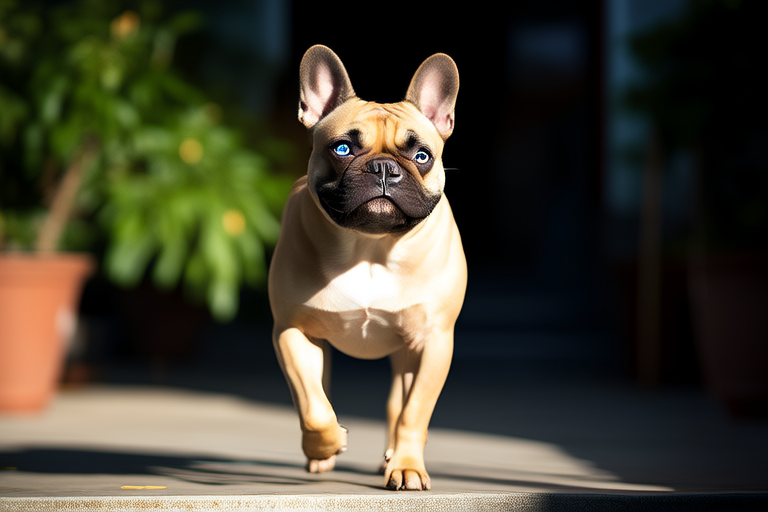From Couch Potato to Capable Companion: How to Train Your Frenchie
Welcome to your comprehensive guide on training your French Bulldog! Frenchies, with their charming personalities and distinctive appearance, are beloved companions. However, like any other breed, they require proper training to become well-behaved, capable companions. This article will walk you through the steps of training your Frenchie, covering basic obedience training, housebreaking tips, socialization techniques, and addressing common behavioral issues. We’ll emphasize the importance of positive reinforcement and provide real-life examples to illustrate key points. Let’s get started!
Basic Obedience Training
Basic obedience training is the foundation of good behavior for your Frenchie. It includes commands such as sit, stay, come, and heel. These commands ensure that your dog listens and responds appropriately in various situations.
Step 1: Start with Sit
Teaching your Frenchie to sit is often the first command taught. Hold a treat close to your dog’s nose and slowly move it up and back over its head. As your Frenchie follows the treat, its bottom should naturally lower into a sitting position. Say “sit” as it sits and immediately reward with praise and the treat. Consistency is key; repeat this exercise several times daily.
Step 2: Introduce Stay
Once your Frenchie masters sit, introduce the “stay” command. Begin by asking your dog to sit, then extend your hand palm forward while saying “stay.” Take a few steps back and return quickly to reward your dog if it remains in place. Gradually increase the distance and duration of the stay command.
Step 3: Teach Come
The “come” command is crucial for safety. Use a happy, excited tone and call your dog’s name followed by “come.” When your Frenchie comes to you, give lots of praise and treats. Practice in a distraction-free environment initially, then gradually introduce more distractions.
Step 4: Heel
Heeling involves walking beside your dog without pulling. Start by holding a leash and treat, then walk forward while encouraging your Frenchie to walk beside you. Reward when your dog stays at your side. Practice this in short sessions to avoid exhaustion.
Housebreaking Tips
Housebreaking can be challenging but is essential for your Frenchie’s comfort and your home’s cleanliness.
Establish a Routine
French Bulldogs thrive on routine. Take your dog outside at consistent intervals, especially after meals, naps, and playtime. Praise and reward your Frenchie when it eliminates outside.
Choose Designated Areas
Select specific areas in your yard for your Frenchie to relieve itself. This helps your dog associate these spots with elimination.
Watch for Signs
Pay attention to signs that your Frenchie needs to go out, such as sniffing around or circling. Redirect your dog to the designated area promptly.
Punishment-Free Zone
Accidents happen. Instead of punishing your Frenchie, clean the area thoroughly to remove odors. This prevents accidents in the same spot due to scent marking.
Socialization Techniques
Socializing your Frenchie ensures it becomes comfortable and well-adjusted around people, animals, and various environments.
Expose Early
Begin socializing your Frenchie as early as possible. Expose it to different people, dogs, and environments. Positive experiences during puppyhood reduce fear and aggression in adulthood.
Use Treats and Toys
Offer treats and toys to encourage positive interactions. For instance, when introducing your Frenchie to new people, have them offer treats to build trust.
Attend Puppy Classes
Enroll in puppy classes where your Frenchie can interact with other dogs under controlled conditions. This teaches bite inhibition and appropriate play.
Gradual Exposure
Introduce new stimuli gradually. For example, take your Frenchie to a quiet park before visiting a busy one. This prevents overwhelming your dog and fosters a positive association.
Addressing Common Behavioral Issues
Behavioral issues are common among young French Bulldogs. Addressing these early can prevent them from becoming ingrained habits.
Barking
French Bulldogs tend to bark, especially when excited or seeking attention. To discourage excessive barking, ignore the behavior until your dog quiets down, then reward calm behavior.
Destructive Chewing
Provide appropriate chew toys and supervise your Frenchie to redirect chewing on inappropriate items. Praise your dog when it chews on approved items.
Separation Anxiety
Some French Bulldogs experience separation anxiety. Gradually acclimate your dog to being alone by leaving it for short periods and rewarding calm behavior upon return. Crate training can also help.
Aggression Toward Other Dogs
Early socialization is crucial to prevent aggression toward other dogs. If your Frenchie shows aggressive tendencies, seek professional help from a trainer or behaviorist.
Maintaining Consistency and Patience
Consistency and patience are vital in training your Frenchie. Remember, every dog learns at its own pace. Here are some tips:
Set Clear Expectations
Be clear about what behaviors are acceptable and which aren’t. Consistent enforcement of rules helps your Frenchie understand expectations.
Stay Positive
Positive reinforcement encourages desired behaviors. Use treats, praise, and affection to reward good behavior. Avoid punishment, which can lead to fear and aggression.
Be Patient
Training takes time. Celebrate small victories and remain patient during setbacks. Every training session brings you closer to a well-trained companion.
Real-Life Example
Sarah, a first-time dog owner, adopted a Frenchie puppy named Charlie. Initially, Charlie had difficulty with the “come” command. Sarah practiced in her backyard, using a long leash and treats. She gradually introduced distractions, like playing with other dogs, ensuring Charlie remained focused on her. Over time, Charlie learned to come reliably, making walks safer and more enjoyable.
Conclusion
Training your French Bulldog requires dedication, patience, and positive reinforcement. By following the steps outlined in this guide, you can transform your couch potato into a capable companion. Remember, each dog is unique, so adapt the training methods to suit your Frenchie’s personality and needs. With consistent effort, you’ll enjoy a strong bond and a well-behaved pet. Happy training!
